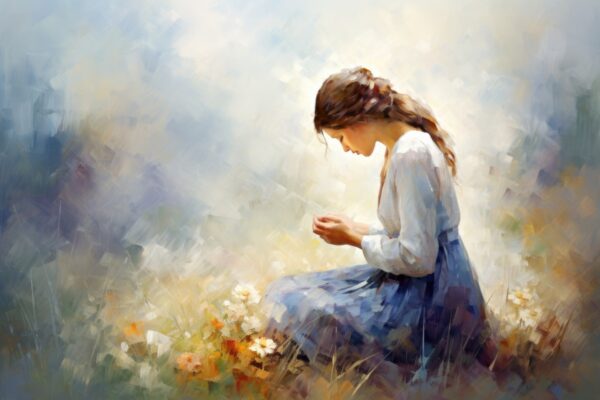There is a popular book, written by Art and Laraine Bennett, that every Catholic should read. In “The Temperament God Gave You,” the authors identify four human temperaments that have roots in ancient Greece. In the briefest of summaries, the choleric is a go-getter with a take-charge attitude. The sanguine is a fun-loving social butterfly. The phlegmatic is an easy-going peacemaker. Lastly, there is the melancholic. I once heard it said that this is “the richest of the temperaments, but at the greatest cost.”
Having melancholic tendencies myself, I agree. Possessing such a temperament has been a mighty burden and a mighty blessing. To address the former, the melancholic possesses an insatiable craving for meaning, identity and purpose — which can often result in a contempt for the ordinary or, as C.S. Lewis warns against in “The Screwtape Letters,” “the horror of the Same Old Thing.” She can simultaneously scoff at the lack of meaning others seem to pursue and envy the ease others seem to possess. She feels emotions very deeply and can be overly sensitive. She can fall into patterns of rumination and hopelessness when trials arise. None of these things are good. I remember bemoaning to God in prayer once in college, “Why is my interior so … complex? Why can’t I simply be?”
The beautiful thing is that a temperament is just that: a temperament. It is not responsible for all habits and outcomes. Yes, the melancholic’s crosses will be different than those of the choleric, but with God’s grace and a leaning into one’s strengths, there are profound blessings that come with it.
Want more Radiant? Sign up for our weekly newsletter!
The distinguishing feature of the melancholic is articulated by the Bennetts. They write, “The melancholic, more than any other temperament, tends to value the ideal … the melancholic so longs for heaven that everything on earth falls short.” Indeed, a hyperfocus on the deficiencies of the self, others, the world and one’s own life experience leads to inevitable frustration and ingratitude. However, a yearning for something greater — the ideal — can also lead to richness of life. Should they choose to lean into their natural proclivities, melancholics experience three profound blessings: beauty, empathy and spirituality.
Beauty
“Indeed, an essential function of genuine beauty, as emphasized by Plato, is that it gives man a healthy ‘shock,’ it draws him out of himself, wrenches him away from resignation and from being content with the humdrum — it even makes him suffer, piercing him like a dart, but in so doing it ‘reawakens’ him, opening afresh the eyes of his heart and mind, giving him wings, carrying him aloft.” — Pope Benedict XVI, Meeting with artists
The melancholic experiences beauty in a profound and personal way. She is often brought to tears by a picturesque sunset, striking concerto or magnificent cathedral. Beauty, indeed, “shocks” the melancholic; in a glimpse, it reveals that the ideal — God — exists. Beauty makes her suffer, as she knows the intense experience of the Ideal is only temporary on earth; she can touch it but cannot grasp it. In his book “Beauty: What it is and Why it Matters,” John-Mark Miravalle writes, “through beauty we’re able to trigger physical reactions to spiritual reality” and “[beauty] provides powerful motivators for action toward spiritual goodness and truth.” Not only does beauty evoke physical reactions — such as tears or feelings of lightness — in response to God, but it also influences personal actions that lead one and others to God.
The melancholic has a gift for experiencing and creating beauty. Practically speaking, she should lean into her artistic and creative abilities. Music, painting, poetry — these can all evoke a sense of beauty within not only the creator but also the viewers or listeners. The vocation of an artist, after all, is to use beauty to draw others closer to God. In the words of Socrates, “God takes away the minds of poets and uses them as his ministers.”
Empathy
“I say móre: the just man justices; / Keeps grace: thát keeps all his goings graces; / Acts in God’s eye what in God’s eye he is — / Chríst — for Christ plays in ten thousand places, / Lovely in limbs, and lovely in eyes not his / To the Father through the features of men’s faces.” — G.M. Hopkins, “As Kingfishers Catch Fire”
The melancholic has a great capacity to be amongst suffering. A positive side of her sensitivity enables her to recognize subtle sufferings that are often overlooked, to feel the pain of others and to walk with them. To allow such empathy to remain idle squanders a gift melancholics bring to the table! Empathy with action is much more valuable, and Pope Francis connects empathy to active service when he writes in Fratelli tutti, “Service always looks to their faces [of the vulnerable], touches their flesh, senses their closeness and even, in some cases, ‘suffers’ that closeness and tries to help them. Service is never ideological, for we do not serve ideas, we serve people” (No. 115). Volunteering, donating, writing letters, genuine listening, visiting those who are sick or lonely — these are tangible ways the melancholic can, as Hopkins relays in the excerpt above, serve as an imitation of Christ on Earth.
Spirituality
“Ah, but a man’s reach should exceed his grasp, / Or what’s a heaven for?” — Robert Browning, “Andrea del Sarto”
Should the melancholic identify the true ideal as God, she has the potential for a life of deep prayer and spirituality. In “The Holy Longing,” priest Ronald Rolheiser defines spirituality by beginning with its root: desire. He writes: “[Desire] is an unquenchable fire, a restlessness, a longing, a disquiet, a hunger, a loneliness, a gnawing nostalgia … [it] can show itself as aching pain or delicious hope.” He goes on to explain that spirituality, then, is whatever one does with that desire. A person’s spirituality can be in many things — alcohol, drugs, art, music — but he reveals the right answer: the true desire is God. This echoes the famous words of St. Augustine: “You have made us for yourself, Lord, and our hearts are restless until they rest in you.”
The melancholic’s insatiable longing can put her in a place of envy and ingratitude if she invests her desires in the wrong places. Her reach will forever extend her grasp if she has no sight of heaven. The melancholic’s greatest blessing is the potential for a deep prayer life and intimate relationship with God. She should make persistent and consistent effort to spend time in the chapel to foster that relationship with him. It is widely thought that saints such as Teresa of Avila and Thérèse of Lisieux had strong melancholic temperaments, and their prayer lives have encapsulated Catholics for centuries.
Indeed, such a temperament is a mighty burden, but it can also be a mighty blessing. If you are a melancholic, frustrated with the complexity your interior seems to throw at you and the weaknesses that result, seek beauty. Seek empathy. Seek spirituality. These things lead to a richness of life and a glimpse of heaven that you are privileged to taste.




